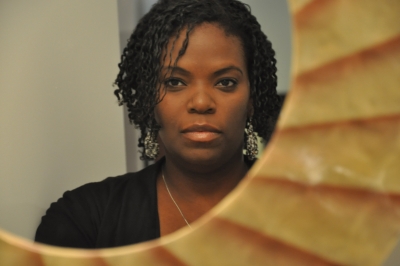Date:
Location:
This talk concerns photographic citizenship as a means of understanding absence, presence, and black pain. Specifically, it engages images of the dead in the New York Times in 1994, from four geographical locations: South Africa, Rwanda, Sudan and Haiti.
In the imagistic space of the documentary photograph, the viewer helps to, in the words of Saidiya Hartman, “obliterate the other” by using the body of the other as a way to articulate their own understanding of the violence of the world. Here, as elsewhere, gender engenders the eye, and dictates the manner and mode of ocular inquiry: of the muting of children, the wailing of women and the perception that death happens quickly and often to an invisible group of marginalized people. This talk will examine the strategies of documentary photography that allow this to occur.
 Kimberly Juanita Brown is Assistant Professor of English and Africana Studies at Mount Holyoke College. Her research gathers at the intersection of contemporary black diasporic literature, critical race theory and visual culture studies. Her book The Repeating Body: Slavery’s Visual Resonance in the Contemporary (Duke University Press) examines contemporary representations of slavery that emphasize the repetition of black women’s corporeal practices in the aftermath of the event of slavery. She is currently at work on a second project examining images of the dead on the cover of the New York Times in 1994. Tentatively titled Their Dead Among Us: Photography, Melancholy, and the Politics of the Visual, this project explores the photographic dispossession of the body of the other and the patterns of exclusion engendered by these ocular practices.
Kimberly Juanita Brown is Assistant Professor of English and Africana Studies at Mount Holyoke College. Her research gathers at the intersection of contemporary black diasporic literature, critical race theory and visual culture studies. Her book The Repeating Body: Slavery’s Visual Resonance in the Contemporary (Duke University Press) examines contemporary representations of slavery that emphasize the repetition of black women’s corporeal practices in the aftermath of the event of slavery. She is currently at work on a second project examining images of the dead on the cover of the New York Times in 1994. Tentatively titled Their Dead Among Us: Photography, Melancholy, and the Politics of the Visual, this project explores the photographic dispossession of the body of the other and the patterns of exclusion engendered by these ocular practices.
Bodies / Archives / Databases
Our museums and computers store bodies. Some are physical, appearing as material objects or as the “negative space” around them, and others are abstracted.
The 2016-17 Gender and Sexuality Seminar Series interrogates the space between the archive, site of haunted specificity and historical embeddedness, and the database, locus of standardization and generalizable knowledge about human normativity, pathology, and variation.
All events take place from 5-7 pm in the Plimpton Room (Barker Center 133, 12 Quincy St.) and are open to the public.
Sponsored by the Mahindra Humanities Center at Harvard University and the Committee on Degrees in Studies of Women, Gender, and Sexuality.